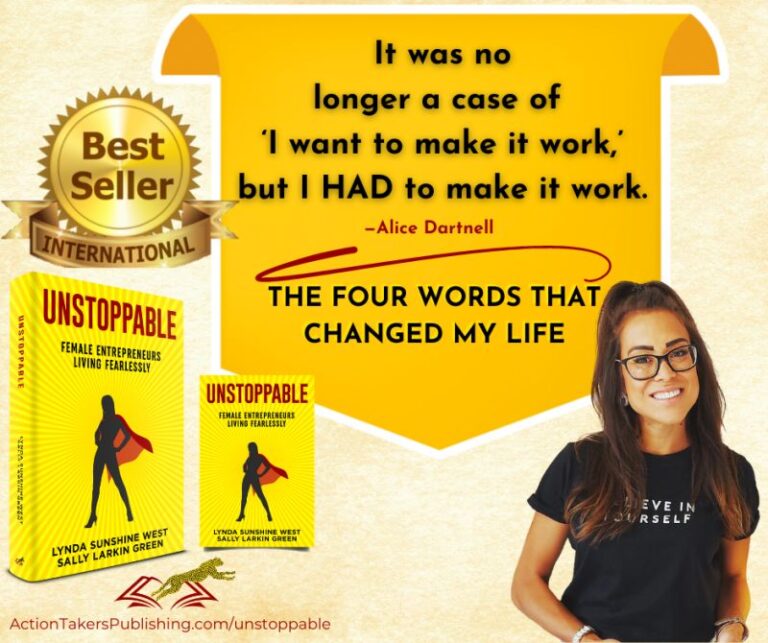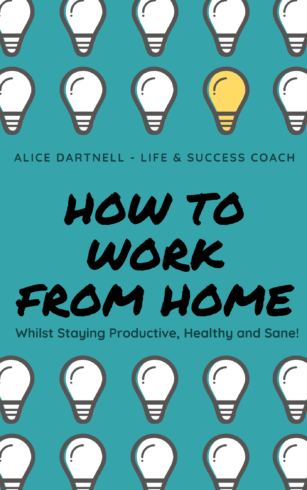Isn’t it time you learned how to stop self-sabotaging and started making progress towards the things you want to do? Stop holding yourself back!
Hi there, I’m Alice. Sometimes, I self-sabotage
There: I said it. Because I’m a life and success coach, I think people assume I have my thoughts straight 100% of the time, but as cheesy as it sounds, no one is perfect. We are all works in progress. I too am learning how to stop self-sabotaging.
I don’t know if there is a “Sabotagers Anonymous”, the equivalent of the 12-step programme to help us overcome this, but if there was, I am sure it would be full.
So what is self- sabotage? According to the article Self-Sabotage, published on the Psychology Today web site, self -sabotage is “behaviour is said to be self-sabotaging when it creates problems in daily life and interferes with long-standing goals. The most common self-sabotaging behaviours include procrastination, self-medication with drugs or alcohol, comfort eating.”
If the concept of someone “self-sabotaging” is new to you, let me explain. On the outside, a self-sabotager looks happy. Actually, they’re probably doing pretty well. They’ve probably got a great job, a supportive social circle, and they’ve got goals and ambitions. But every now and again, they do something, unbeknown to anyone: they’ll basically just screw themselves over with no one to blame but themselves.
Tip 1: Positive affirmations
Tip 2: Reflect
Tip 3: Remember the long-term goal
Tip 1: Positive affirmations
Tip 2: Reflect
Tip 3: Remember the long-term goal
For me, I have noticed my self-sabotaging ways when it came to my food, fitness, and physique. After years of battling an eating disorder when I was younger, I am now someone who is so passionate about her health and wellbeing. Someone who wants to be in the best physical shape possible, so she can run around her crazy life with full energy. I also understand how poor health habits are one of the ‘Four Thieves’ that can hold you up and seriously impacts upon your time management and productivity.
But, every now and again, something will set me off, and I’ll binge-eat and be unhealthy. Like my most recent episode last year, which saw me scoff down a bar of chocolate at 10.30pm every night because I was going through a bit of a stressful time. Why do I do this? Well, this is something I worked out with my life coach, and I think it boiled down to me subconsciously thinking I can’t have it all. So, if I have to upset something up in my life, it is always my fitness, health, and physique – I guess I kept getting pulled back to the old mindset I had when I didn’t look after my body.
I think that is one of the underlying issues of how to stop self-sabotaging. There is a deep-running belief that we can’t possibly have it all, so rather than letting something mess it up, let’s be in control and mess it up ourselves. And who is to blame us, because society has brought us up with stories like “you can’t have your cake and eat it too”. Telling us that you “can’t have it all”, it’s “brains or beauty” but never both. Or how we refer to someone as a “lucky bitch” if they have good looks, a rich husband, well-behaved kids, and a big house.

Gay Hendricks in his book ‘The Big Leap‘ poses this to us. He disagrees with the notion that it’s life’s hard knocks that give us the best education. He shows us how our “Upper Limit” problem causes us to self-destruct. This is the belief that we have a certain limit, and when we reach it, we self-sabotage as a way to put us back “in our place”.
I had a similar conversation with a 1-2-1 coaching client recently. She was concerned that she is always waiting for something bad to happen to her in her business because it hasn’t yet. There’s that assumption! Something bad is going to happen because, well… it just does, doesn’t it!
This is where us self-sabotagers have to be careful, because if something doesn’t come along to bump us off our merry wheel of life, we’ll do it to ourselves.
But I have a question for you that I asked my friend… what if something has already happened that we would deem as “bad”, but it’s just that because you’re such a brilliant, resilient person, you haven’t realised it was bad and just dealt with it and cracked on? Meaning, the bad thing has happened, and you just didn’t register it?
Did you know that 95% of what we think, feel, and do is a routine habit, and we’re not actually fully conscious of it? The same is true of self-sabotage – it is not you, it is just a habit, so the good news is you can break it. Liken it to giving up something that is bad for you, like smoking, your questionable choice in men, or getting your dirty pants out the laundry basket when you haven’t done your washing. Okay, learning how to stop self-sabotaging might be hard at first, but it is a habit you can break it.
Just as easily as you can form a bad habit, you can simply flip things into a good habit. However, to do this you must be aware of both your good and bad habits. As Charles Duhigg explains in his book, The Power Of Habit, “In order to change any habits, we first must have awareness of them. One of the difficulties around habits is that it’s possible to learn and make unconscious choices without remembering anything about the decision making… Habits can emerge without our permission”
As Charles Duhigg writes, habits can make or break us, so make sure you have your habits in check! In my blog, Why Creating Good Habits are the Real Secret to Success, I explain what a habit is, why good habits are the key to success, and how to create new positive habits.

So what can I do to stop self-sabotaging? Well, talking from my own experience, there are so many tips I want to share with you, but for now, here are three of my top tips to help you.
Tip 1: Positive affirmations
I like to think of positive affirmations as simply what you say to yourself, especially when no one is around. Sounds simple, but I bet you are like me in that you speak to yourself worse than anyone else. The things you say to yourself would sound mental to anyone if you said it out aloud – I mean, seriously, who berates themselves like that?
But we all do.
The logical Alice always knows I am not fat, lazy, a failure, stupid, blah-blah-blah, but I have told myself this a million times. Practicing the use of positive affirmations means swapping out the negative internal chat for more uplifting and inspiring messages to myself. Whether it is a motivational postcard I have been sent, like from my friend Kris (“This girl can”), or my own personal positive affirmation (“I have plenty of time to do everything I need to do every day”), I have these plastered all over my house as a daily reminder.
This is so important because your brain stores what you input in, not what is fact – whether you feed it rubbish (“I am useless, I am fat, I can’t get a promotion, I am bad at maths…”) or fact, your brain stores it! So be careful what you are telling yourself, because it has a huge effect on your mindset.
Create for yourself a set of positive affirmations today and display them everywhere! Remind yourself how amazing you can be.

Tip 2: Reflect
How are you ever going to stop self-sabotaging if you can’t even recognise that you are doing it?
The best way is to start to raise your self-awareness. Become conscious of what makes you tick, angry, or fall of the bandwagon.
For me, I noticed that I was self-sabotaging when everything in my life was going well. For example, I would get to a level of fitness, strength, and physique I was happy and comfortable with, then suddenly out of nowhere, I would lose the consistency of it. What was that all about!?!
After some analysing of all the times I have done this, I started to recognise the patterns… my wedding, my 30th, getting fit for my trek to Machu Pichu. For me, I realised it boiled down to a (misguided) belief that I can’t have it all. So when things were going well, I would subconsciously screw things up for myself. And because of my past issues, it would always be the health, fitness, and body goals that I would secretly self-sabotage.
The good news, though, is that recognising this has made me self-aware over time. Now I am able to spot these things earlier. I still have my moments, everyone does, but being aware means you can put systems in place to help you overcome your own worst enemy (that is you, by the way). Like the other day: I caught myself self-sabotaging my healthy eating plan… The classic “oh, I have eaten one biscuit, so I might as well eat the whole packet”. I realised this was me self-sabotaging – no one was forcing those biscuits on me. I stopped before I started!
(NOTE: Just in case you hadn’t realised it yet – you can and deserve to have it all.)
Tip 3: Remember the long-term goal
As a life and success coach, I am a huge believer that to reach new goals, we have to improve our thinking and upgrade ourselves. This is not to say we have to change; we should still be us, but we do have to become something more. For example, if you want a promotion at work, it isn’t about putting more hours in and doing more. It’s about becoming a leader, able to horizon-scan, or becoming more emotionally intelligent.
Sounds easy, but ‘becoming’ can be difficult, as we are pulled back by our habits into our old ways. This is the prime time for self-sabotage too, I think.

One of the ways I started to overcome this when it came to my eating is that I started linking myself to what I wanted long-term. Immediate gratification-led Alice wants the cookie NOW. (That is a lie, by the way, the greedy cow wants three or four!). But what I really want long-term is to be fit, never get ill (I hate being ill) and, at my peak physical state, to feel like I can take on the world. Eating an entire packet of chocolate-chip cookies every time I feel a little down or tired, no matter how chewy and gooey they are, is not going to help with this goal.
By constantly linking up to what I want long-term, I am finding that I am self-sabotaging less and less. It’s as if logical Alice kicks in to help me make the right choices – self-sabotage can often be done in the ‘heat of the moment’ or subconsciously.
Do you procrastinate? Have you ever found yourself stalled or stuck when faced with an important task? You’re far from alone in this. Did you know even highly driven and accomplished people can still be procrastinators? We assume that procrastination is for the laziest of us, but I don’t think that is the case – your procrastination could be anything from analysis paralysis or not believing in yourself rather than just your lack of get up and go.
Read my blog, Procrastination: A Brief Guide on How to Stop Procrastinating, to find out how you identify if you are a procrastinator and help you identify what type of procrastinator you are. In the blog I explain practical solutions to stop procrastinating so you can improve your health, time management and productivity.
I bet you’ve been told at least at some point in your life, that if you want to achieve success, you need to have specific goals. The more specific the better right? Well… not always. In my blog, Power of Goal Setting Using ‘Range Goals‘, I throw a spanner in the works when it comes to goal setting and the traditional “SMART” goal setting ways. I instead, I will show you why setting a forward-looking “range goal” is a smarter alternative to the traditional SMART goals.
Get your free copy of the mini-training – “From Procrastinator to Proactive” Mini-Masterclass” HERE.

“I initially signed up with Alice to help me with my time management and productivity in my business and everyday life. Alice is a fantastic coach. She is supportive, kind. I love her honest, no bullshit approach. Since working with Alice I have discovered so many new ways of doing things. She has helped me uncover the root of some of my habitual tendencies and transform them. The amount of care and support she offers is priceless. I highly recommend working with her.”
Oonagh English DipNT mNTOI – Life Coach and Nutritional Therapist
You can find out more about my current services and and register your interest for future courses and programmes by sending me an email to:

My collaboration book, “Unstoppable: Female Entrepreneurs Living Fearlessly” was published in January 2024 a is already a BEST SELLER!!!
My chapter, titled “The Four Words That Changed My Life” shares my ‘unstoppable story’.
You know me, so expect rawness and honesty through my journey the last couple of years following that day in September 2020 that changed EVERYTHING!!!
Get your copy of my book “Unstoppable: Female Entrepreneurs Living Fearlessly”!
On sale in the UK for just 78p! To purchase your copy click HERE
In the USA you can purchase your copy for just 99 cents just click HERE

Have you ever wondered what does it take to successfully work from home? My latest book is a hands-on guide for everyone working at home. It will show you in easy to read tips how to work from home, whilst staying productive, healthy and sane.
In informative, easy to read chapters, you will learn how to set up your own dedicated workspace, select the right office equipment and tips for video calling and conferencing. You will also learn the importance of setting and maintaining boundaries inside the home, managing distractions, avoiding procrastination and learn how to establish a routine that suits your lifestyle.
With many people working from home for the first time, this book is a practical guide to show you how to work from home, whilst staying productive, healthy and sane.
On sale for just £2.42 / $2.99! To purchase your copy click the Amazon button below!
Click below for more information!
This article is written by Alice Dartnell, life and success coach of Alice Dartnell Limited. Alice empowers busy professionals to be successful, transform their lives and achieve more by improving their confidence, mindset and time management.
For more information please see www.alicedartnell.com
Copyright © 2022 Alice Dartnell Limited
Disclaimer
This blog is published by Alice Dartnell Limited solely for educational and entertainment purposes. The author and publisher are not offering it as legal, accounting, health care or other professional services advice. While best efforts have been used in preparing this blog, the author and publisher make no representations or warranties of any kind and assume no liabilities of any kind with respect to the accuracy or completeness of the contents. Neither the author nor the publisher shall be held liable or responsible to any person or entity with respect to any loss or incidental or consequential damages caused, or alleged to have been caused, directly or indirectly, by the information contained herein. Every person and company are different, and the advice and strategies contained herein may not be suitable for your situation. Alice Dartnell or Alice Dartnell Limited is not liable for the contents of any external internet sites listed, nor does it endorse any commercial product or service mentioned or advised in this blog. You should seek the services of a competent professional as appropriate. You are responsible for your own choices, actions, and results. Always consult your own General Practitioner if you’re in any way concerned about your health.


